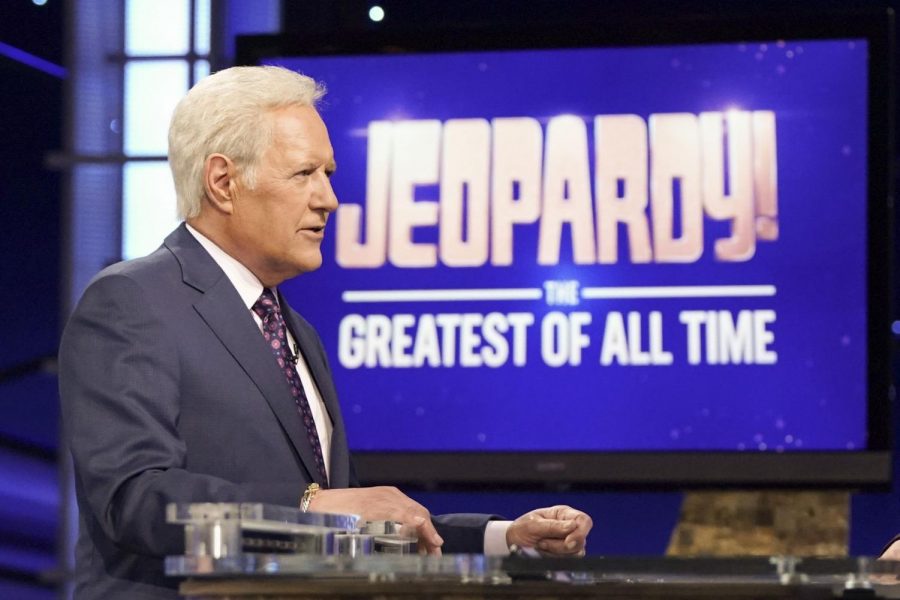Remembering Alex Trebek, the last consistent, comforting voice of TV
Courtesy of Sony Pictures Television
With Trebek’s death, the era of unifying cultural figures in America has ended.
November 13, 2020
It’s difficult to explain the role Alex Trebek has had in my life.
I’m a fan of “Jeopardy!,” and have been for as long as I can remember. Every weeknight at 7:30 p.m., I’d sit down with my father and watch the show, ostensibly for the trivia, but it was the longtime host of “Jeopardy!” that bound the experience together, rattling off answers with his dulcet tones and witty demeanor. As I shouted my answers in the form of a question at the screen, dreaming of myself as a “Jeopardy!” contestant, it was always Alex I imagined answering back. He and the show have been intertwined in my mind, inseparable and synonymous, and I can imagine it was the same for most of the American public until his death on Sunday, Nov. 8.
Trebek has been the face of “Jeopardy!” since hosting the show’s revival in 1984, after the original version that ran from 1964 to 1975 ended, and since then, it has become a staple of the American ethos. “Jeopardy!” is the truest manifestation of a meritocracy, with contestants competing based on their knowledge of facts across a variety of topics and their betting abilities. The idea of a trivia game show isn’t new, but the way “Jeopardy!” presented itself allowed it to stand out apart from the pack and tap into the curiosity within us all, and a lot of that was thanks to Trebek.
If you’re not familiar with “Jeopardy!,” the show features three contestants, presented with a board with six categories of five clues each. Additionally, each clue has a monetary award attached to it, increasing with the level of difficulty of the clue, the value of which is added to a player’s score if they answer correctly and deducted if they answer incorrectly. Special clues known as “Daily Doubles” are hidden within the board, where players have to wager a portion of their score before the clue is revealed. This gameplay lasts for two rounds, “Jeopardy!” and “Double Jeopardy!,” before “Final Jeopardy!,” where contestants hear the category before wagering any amount of their winnings and then write down their answers for a final showdown. Oh, and all the clues are presented in the form of an answer, and all the contestants’ responses have to be in the form of a question.
As you can see, there is a lot of strategy that can take place within the game, with contestants like James Holzhauer, who has the highest single-game score totals of any “Jeopardy!” contestant, sweeping through high-value questions and wagering everything on Daily Doubles.
Of course, anyone competing has to be pretty smart to do well, making “Jeopardy!” almost an Olympics for nerds. As a quiz bowl player in my high school days, the tournament circuits I ran through were almost a “minor league” for Jeopardy contestants, with the majority of “Jeopardy! Teen Tournament” contestants and nearly half of all “College Championship” contestants having played in quiz bowl at some time. As such, “Jeopardy!” was what we all strived for, and yes, we all were nerds.
However, Trebek’s presence broadened the show’s appeal beyond just us nerds: His dry humor, knowledgeable attitude and evident sincerity made him an icon around the country, while the show’s regularity made him almost a family member for many. The ritual of watching him every night made him one of the more consistent figures on television for decades, one of the only ones all Americans shared, devoid of politics and imbued with factuality. In an era of alternative facts and political polarization, Alex Trebek and “Jeopardy!” have been some of the only things that all Americans could share.
Since his diagnosis of pancreatic cancer last March, there have been outpourings of grief, but no tribute was as poignant or accurate as Ken Jennings’, who has the longest winning streak on “Jeopardy!” and won the recent “Jeopardy! The Greatest of All Time” tournament, “I’ve said this before but Alex Trebek is in a way the last Cronkite: authoritative, reassuring TV voice you hear every night, almost to the point of ritual.” Indeed, Trebek was the last of the unifying cultural figures of America, and with his death the country turns a page, definitively for the worse.



